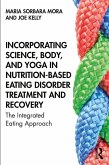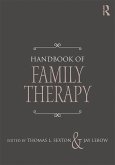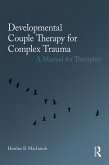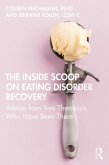Adapting Evidence-Based Eating Disorder Treatments for Novel Populations and Settings (eBook, ePUB)
A Practical Guide
Redaktion: Tortolani, Christina C.; Le Grange, Daniel; Goldschmidt, Andrea B.
41,95 €
41,95 €
inkl. MwSt.
Sofort per Download lieferbar

21 °P sammeln
41,95 €
Als Download kaufen

41,95 €
inkl. MwSt.
Sofort per Download lieferbar

21 °P sammeln
Jetzt verschenken
Alle Infos zum eBook verschenken
41,95 €
inkl. MwSt.
Sofort per Download lieferbar
Alle Infos zum eBook verschenken

21 °P sammeln
Adapting Evidence-Based Eating Disorder Treatments for Novel Populations and Settings (eBook, ePUB)
A Practical Guide
Redaktion: Tortolani, Christina C.; Le Grange, Daniel; Goldschmidt, Andrea B.
- Format: ePub
- Merkliste
- Auf die Merkliste
- Bewerten Bewerten
- Teilen
- Produkt teilen
- Produkterinnerung
- Produkterinnerung

Bitte loggen Sie sich zunächst in Ihr Kundenkonto ein oder registrieren Sie sich bei
bücher.de, um das eBook-Abo tolino select nutzen zu können.
Hier können Sie sich einloggen
Hier können Sie sich einloggen
Sie sind bereits eingeloggt. Klicken Sie auf 2. tolino select Abo, um fortzufahren.

Bitte loggen Sie sich zunächst in Ihr Kundenkonto ein oder registrieren Sie sich bei bücher.de, um das eBook-Abo tolino select nutzen zu können.
This comprehensive text provides practical approaches to adapting empirically supported treatments for eating disorders for clinicians working with patients of diverse backgrounds and presentations, or within non-traditional treatment settings across levels of care.
- Geräte: eReader
- ohne Kopierschutz
- eBook Hilfe
- Größe: 2.93MB
Andere Kunden interessierten sich auch für
![Adapting Evidence-Based Eating Disorder Treatments for Novel Populations and Settings (eBook, PDF) Adapting Evidence-Based Eating Disorder Treatments for Novel Populations and Settings (eBook, PDF)]() Adapting Evidence-Based Eating Disorder Treatments for Novel Populations and Settings (eBook, PDF)41,95 €
Adapting Evidence-Based Eating Disorder Treatments for Novel Populations and Settings (eBook, PDF)41,95 €![Incorporating Science, Body, and Yoga in Nutrition-Based Eating Disorder Treatment and Recovery (eBook, ePUB) Incorporating Science, Body, and Yoga in Nutrition-Based Eating Disorder Treatment and Recovery (eBook, ePUB)]() Maria Sorbara MoraIncorporating Science, Body, and Yoga in Nutrition-Based Eating Disorder Treatment and Recovery (eBook, ePUB)33,95 €
Maria Sorbara MoraIncorporating Science, Body, and Yoga in Nutrition-Based Eating Disorder Treatment and Recovery (eBook, ePUB)33,95 €![Handbook of Family Therapy (eBook, ePUB) Handbook of Family Therapy (eBook, ePUB)]() Handbook of Family Therapy (eBook, ePUB)89,95 €
Handbook of Family Therapy (eBook, ePUB)89,95 €![Assessing Family Relationships (eBook, ePUB) Assessing Family Relationships (eBook, ePUB)]() Theresa BeetonAssessing Family Relationships (eBook, ePUB)37,95 €
Theresa BeetonAssessing Family Relationships (eBook, ePUB)37,95 €![Developmental Couple Therapy for Complex Trauma (eBook, ePUB) Developmental Couple Therapy for Complex Trauma (eBook, ePUB)]() Heather B. MacintoshDevelopmental Couple Therapy for Complex Trauma (eBook, ePUB)37,95 €
Heather B. MacintoshDevelopmental Couple Therapy for Complex Trauma (eBook, ePUB)37,95 €![The Inside Scoop on Eating Disorder Recovery (eBook, ePUB) The Inside Scoop on Eating Disorder Recovery (eBook, ePUB)]() Colleen ReichmannThe Inside Scoop on Eating Disorder Recovery (eBook, ePUB)26,95 €
Colleen ReichmannThe Inside Scoop on Eating Disorder Recovery (eBook, ePUB)26,95 €![Beyond a Shadow of a Diet (eBook, ePUB) Beyond a Shadow of a Diet (eBook, ePUB)]() Judith MatzBeyond a Shadow of a Diet (eBook, ePUB)35,95 €
Judith MatzBeyond a Shadow of a Diet (eBook, ePUB)35,95 €-
-
-
This comprehensive text provides practical approaches to adapting empirically supported treatments for eating disorders for clinicians working with patients of diverse backgrounds and presentations, or within non-traditional treatment settings across levels of care.
Dieser Download kann aus rechtlichen Gründen nur mit Rechnungsadresse in A, B, BG, CY, CZ, D, DK, EW, E, FIN, F, GR, HR, H, IRL, I, LT, L, LR, M, NL, PL, P, R, S, SLO, SK ausgeliefert werden.
Produktdetails
- Produktdetails
- Verlag: Taylor & Francis eBooks
- Seitenzahl: 442
- Erscheinungstermin: 16. November 2020
- Englisch
- ISBN-13: 9780429632174
- Artikelnr.: 60349375
- Verlag: Taylor & Francis eBooks
- Seitenzahl: 442
- Erscheinungstermin: 16. November 2020
- Englisch
- ISBN-13: 9780429632174
- Artikelnr.: 60349375
- Herstellerkennzeichnung Die Herstellerinformationen sind derzeit nicht verfügbar.
Christina C. Tortolani, Ph.D., is an Associate Professor at Rhode Island College, adjunct faculty at Brown Medical School, and a licensed psychologist specializing in eating disorders. Andrea B. Goldschmidt, Ph.D., is an Associate Professor (Research) at Brown Medical School who conducts research on maladaptive eating and overweight/obesity across the lifespan. Daniel Le Grange, Ph.D., holds a distinguished professorship at the University of California, San Francisco, and is Director of the Eating Disorders Program in the Department of Psychiatry and Behavioral Sciences. He is also Emeritus Professor of Psychiatry and Behavioral Neuroscience at the University of Chicago.
PART I: Adapting Evidence-Based Treatments for Novel Populations: Chapter
1: Cultural Adaptations of Evidence-Based Treatments for Eating Disorders;
Chapter 2: Modifying Treatments to Recognize the Pursuit of Muscularity,
and Related Eating Psychopathology, Among Men; Chapter 3: Where is the
Evidence of Evidence-Based Treatment for LGBTQIA+ Individuals Experiencing
Eating Disorders?; Chapter 4: Utilizing Alternate Caregivers and Support
Persons in Eating Disorder Treatment; Chapter 5: Implementing Eating
Disorder Treatment Before and After Bariatric Surgery; Chapter 6:
Evidence-Based-Treatments for Youth with Overweight/Obesity; Chapter 7:
Adapting Evidenced-Based Therapies for Avoidant/Restrictive Food Intake
Disorder; Chapter 8: Treating Eating-Related Problems in Non-Eating
Disordered Populations; Chapter 9: Eating Disorders and Disordered Eating
in the Military Family; Chapter 10: Integrating Evidence-Based Treatments
for Eating Disorder Patients with Comorbid PTSD and Trauma-Related
Disorders; Chapter 11: Treating Eating Disorders in Pregnancy and the
Postpartum Period; Chapter 12: Tailoring Treatments to Middle-Aged and
Older Adults; PART II: Applying Evidence-Based Treatments in Nontraditional
Treatment Settings; Chapter 13: Delivering Evidence-Based Treatments for
Eating Disorders in the Home-Based Setting; Chapter 14: Using Remote
Methods to Deliver Evidence-Based Treatment for Eating Disorders; Chapter
15: Using FBT and Adjunctive Family Interventions in a Partial
Hospitalization Program for Adolescents with Eating Disorders; Chapter 16:
Ensuring Continuity of Family-Based Care across Levels of Treatment;
Chapter 17: Primary Care-Based Treatment for Eating Disorders; Chapter 18:
eHealth Interventions for Eating Disorders; Afterword: Novel Research,
Training, and Supervision Opportunities for Evidence-Based Treatment
Adaptations
1: Cultural Adaptations of Evidence-Based Treatments for Eating Disorders;
Chapter 2: Modifying Treatments to Recognize the Pursuit of Muscularity,
and Related Eating Psychopathology, Among Men; Chapter 3: Where is the
Evidence of Evidence-Based Treatment for LGBTQIA+ Individuals Experiencing
Eating Disorders?; Chapter 4: Utilizing Alternate Caregivers and Support
Persons in Eating Disorder Treatment; Chapter 5: Implementing Eating
Disorder Treatment Before and After Bariatric Surgery; Chapter 6:
Evidence-Based-Treatments for Youth with Overweight/Obesity; Chapter 7:
Adapting Evidenced-Based Therapies for Avoidant/Restrictive Food Intake
Disorder; Chapter 8: Treating Eating-Related Problems in Non-Eating
Disordered Populations; Chapter 9: Eating Disorders and Disordered Eating
in the Military Family; Chapter 10: Integrating Evidence-Based Treatments
for Eating Disorder Patients with Comorbid PTSD and Trauma-Related
Disorders; Chapter 11: Treating Eating Disorders in Pregnancy and the
Postpartum Period; Chapter 12: Tailoring Treatments to Middle-Aged and
Older Adults; PART II: Applying Evidence-Based Treatments in Nontraditional
Treatment Settings; Chapter 13: Delivering Evidence-Based Treatments for
Eating Disorders in the Home-Based Setting; Chapter 14: Using Remote
Methods to Deliver Evidence-Based Treatment for Eating Disorders; Chapter
15: Using FBT and Adjunctive Family Interventions in a Partial
Hospitalization Program for Adolescents with Eating Disorders; Chapter 16:
Ensuring Continuity of Family-Based Care across Levels of Treatment;
Chapter 17: Primary Care-Based Treatment for Eating Disorders; Chapter 18:
eHealth Interventions for Eating Disorders; Afterword: Novel Research,
Training, and Supervision Opportunities for Evidence-Based Treatment
Adaptations
PART I: Adapting Evidence-Based Treatments for Novel Populations: Chapter
1: Cultural Adaptations of Evidence-Based Treatments for Eating Disorders;
Chapter 2: Modifying Treatments to Recognize the Pursuit of Muscularity,
and Related Eating Psychopathology, Among Men; Chapter 3: Where is the
Evidence of Evidence-Based Treatment for LGBTQIA+ Individuals Experiencing
Eating Disorders?; Chapter 4: Utilizing Alternate Caregivers and Support
Persons in Eating Disorder Treatment; Chapter 5: Implementing Eating
Disorder Treatment Before and After Bariatric Surgery; Chapter 6:
Evidence-Based-Treatments for Youth with Overweight/Obesity; Chapter 7:
Adapting Evidenced-Based Therapies for Avoidant/Restrictive Food Intake
Disorder; Chapter 8: Treating Eating-Related Problems in Non-Eating
Disordered Populations; Chapter 9: Eating Disorders and Disordered Eating
in the Military Family; Chapter 10: Integrating Evidence-Based Treatments
for Eating Disorder Patients with Comorbid PTSD and Trauma-Related
Disorders; Chapter 11: Treating Eating Disorders in Pregnancy and the
Postpartum Period; Chapter 12: Tailoring Treatments to Middle-Aged and
Older Adults; PART II: Applying Evidence-Based Treatments in Nontraditional
Treatment Settings; Chapter 13: Delivering Evidence-Based Treatments for
Eating Disorders in the Home-Based Setting; Chapter 14: Using Remote
Methods to Deliver Evidence-Based Treatment for Eating Disorders; Chapter
15: Using FBT and Adjunctive Family Interventions in a Partial
Hospitalization Program for Adolescents with Eating Disorders; Chapter 16:
Ensuring Continuity of Family-Based Care across Levels of Treatment;
Chapter 17: Primary Care-Based Treatment for Eating Disorders; Chapter 18:
eHealth Interventions for Eating Disorders; Afterword: Novel Research,
Training, and Supervision Opportunities for Evidence-Based Treatment
Adaptations
1: Cultural Adaptations of Evidence-Based Treatments for Eating Disorders;
Chapter 2: Modifying Treatments to Recognize the Pursuit of Muscularity,
and Related Eating Psychopathology, Among Men; Chapter 3: Where is the
Evidence of Evidence-Based Treatment for LGBTQIA+ Individuals Experiencing
Eating Disorders?; Chapter 4: Utilizing Alternate Caregivers and Support
Persons in Eating Disorder Treatment; Chapter 5: Implementing Eating
Disorder Treatment Before and After Bariatric Surgery; Chapter 6:
Evidence-Based-Treatments for Youth with Overweight/Obesity; Chapter 7:
Adapting Evidenced-Based Therapies for Avoidant/Restrictive Food Intake
Disorder; Chapter 8: Treating Eating-Related Problems in Non-Eating
Disordered Populations; Chapter 9: Eating Disorders and Disordered Eating
in the Military Family; Chapter 10: Integrating Evidence-Based Treatments
for Eating Disorder Patients with Comorbid PTSD and Trauma-Related
Disorders; Chapter 11: Treating Eating Disorders in Pregnancy and the
Postpartum Period; Chapter 12: Tailoring Treatments to Middle-Aged and
Older Adults; PART II: Applying Evidence-Based Treatments in Nontraditional
Treatment Settings; Chapter 13: Delivering Evidence-Based Treatments for
Eating Disorders in the Home-Based Setting; Chapter 14: Using Remote
Methods to Deliver Evidence-Based Treatment for Eating Disorders; Chapter
15: Using FBT and Adjunctive Family Interventions in a Partial
Hospitalization Program for Adolescents with Eating Disorders; Chapter 16:
Ensuring Continuity of Family-Based Care across Levels of Treatment;
Chapter 17: Primary Care-Based Treatment for Eating Disorders; Chapter 18:
eHealth Interventions for Eating Disorders; Afterword: Novel Research,
Training, and Supervision Opportunities for Evidence-Based Treatment
Adaptations







